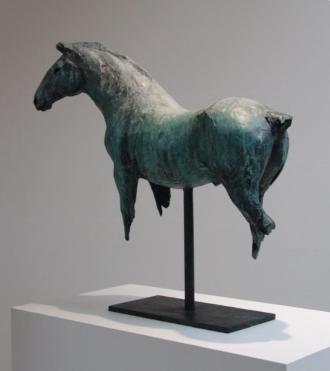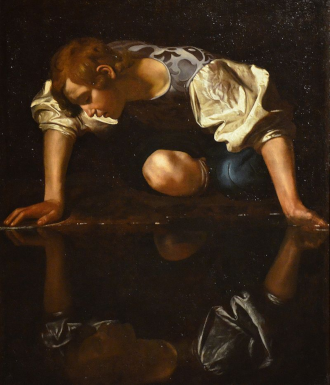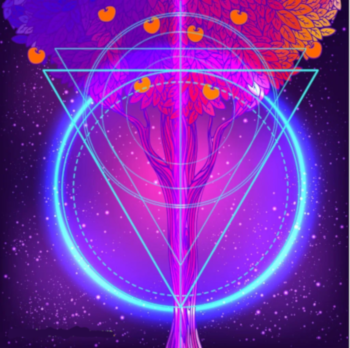my Self
My Self as well as everyone's Self is of
concern. It is the never-ending hindrance to penitence,
but also the bag in which the jumble of the necessary conscience
belongs, as it is an integral part of everyone as a sinner.
I will not solve the problem raised by it either through this
entry or in this generation, but it is worth keeping the Self in
mind.
I need no science (33/8) to look at my Self. I am not
looking at the the philosophic Self, I am just talking about my
Self, that I have a hard time weakening and reducing, and yet
failing in my attempts to get rid of it, after the Father's
Messenger had told me, "You are nothing more for
yourself (Rev of Arès 40/6)."
Sin, which I carry, is the heavy weight of my
forefathers ever since Adam's days (Rev of Arès
2/1-5) and it has not spared me. Like each human being
all over the sinful world I am shut up in my Self big
iron pipe.
The big pipe of my Self, that shuts me in, has two holes before
my eyes, a hole before my mouth. My noble thoughts would be
keeping on turning around in it, if in my prophetic time The
Revelation of Arès should not fly away through the holes
like Noah's dove and leave me to hope that it might at
last find the world and never return.
The Revelation of Arès has patiently filed down the
iron of my pipe, and on some days it too reduces it to some
openworked iron. The Revelation of Arès in my
prophetic time has taken precedence over my own word and sent love
through the my iron Self. This likely is why the Father calls me
the iron voice (Rev of Arès iii/3, vi/6, x/1, xvi/6,
xvii/2). This undoubtedly is why the infinitely Good
Father accredits my word and considers it as His own (xxxi/10),
as He is aware that my Self speaks
inescapably.
____________________________________

my Self
is a
legless
horse,
which couldn't
go anywhere
else than
within itself,
if the Father's Word
would not lift it

Narcissus gazing
at his reflection.
The Self is painted by Caravaggio as
the impossibility
of seeing anything else than oneself,
but the Self possibly can be something else, really.
What do the present day moralits and thinkers
think about the Self? I have not gotten any inkink of this; it is
as if the Self had vanished. If I direct a talk towards the Self,
it as a topic puts people in an awkward position; none of the few
that embark on it seems to have any Self or any idea about the
Self from what they may have read, whether in Nietzsche's
naturalism, Freud's unconscious, Marcuse's principle of repressive
reality... In short, the Self as a subject of thinking or talk has
disappeared.
The Self was commented in bygone days and usually considered as
abhorrent, but the abhorrence was either hypocritical or
reflective. It was hypocritical, because the haughty have forever
loved looking moderate. It was reflective, because I mainly see
the Self talk to itself.
I have fought against the reflectivity of my Self much. I shut in
my own person as if I were in an iron pipe can't help but have a
Self. As I am spread too thin just as all men are son earth are, I
cannot launch the Father's Word all the time; I cogitate about a
lot of other points: how to tidy my study, unblock the sink,
hammer a nail in, write to the tax office, take a shower, get
dressed, do up my shoes, taste the soup, read, sleep, and so on.
The moving of life! As cogitation and verbiage form a continual
self-return, I talk to my Self and to the leaden world much more
often than to the feather world, that which is able to fly away, change
(Rev of Arès 28/7), and which I have to find. In other
words I get the wrong objective much more often than I reach the
right one, and when I realise my error, I happen to hope that I
will die soon so as to mix with Life (24/5) and so be
oversimplified, come down to my soul and be dissolved.
Poor me! If I consider my death as a refuge, a relief, I am just a
goddam egoist. So I make it a rule to undergo the yoke of my Self
like an ox moving towards the world to save it and I avoid
considering myself as an escaped dove. I prefer leading the life
of a slow frail apostle to living the life of a soul
among the stars up there, which is to come soon enough. So I
remain a prophet even if I cannot issue my Call
as much as I would like, because I can only issue it at my prophetic
hours, when my word that is the Word (Rev of Arès ii/12,
xxxi/10) addresses the world through my openworked iron
pipe, even if I cannot shout it and prevent it from being lost or
avoid to get a backlash from it as a slap in the face.
The haughty, who always are well aware of what I should do, scold
me so that I may take off My Self as a too heavy packsaddle of the
True on the donkey I am, but can I be anything else than
a donkey? I know that the True will not come into
existence, unless it will bounce and bounce and glide along
without meeting any obstacle from man to man rather than be
hiccuped from Self to Self in a slow hiccup, just as is the case
today. My iron Self cannot issue the Breath but in fits
and starts ; I cannot do otherwise for the time being; my brothers
and sisters of the Harvest can't either. However, it is
the beginning: It will require more than four generations
(Rev of Arès 24/2).
The Scripture (Bible, Quran, Vedas, and so on.) treats nothing
about the Self as such — I mean the Self of the little man, of the
general public —. The Scripture acts out only big-big Selves, the
very proud persons, the conceited, the notable mean presumtuous.
At the very time of the Scripture an ancient Greek (Socrates,
Aristotle) was unaware of the Self too ignorait aussi. Why? It
might be so, because the Self was not seen as the bag in which
conscience was shut in. Later, for the moralistic Christian times,
the Self was deemed disgusting and condemned. Today again people
just do not talk about the Self, they would rather recall the
systems and the mighty. The Self of the little man, that in the
street we bump into, is unknown so to speak. However, it is not
the little man that the apostle bumps into, it is the little man's
invisible Self or hidden iron pipe he collides with.
An infant is born without a Self, it is as pure as God. If you sit
a baby down in front of a mirror, the baby sees someone else. Its
Self takes form later on the day it sees itself. When God talks
about His Children (Rev of Arès 13/8), He evokes pure
babies, a state which we have to recover, when the iron pipe of
the Self has rusted and disppeared entirely.
There is no need to call up the seething philosophic thought about
the Self. I just recall a man, who with genius treated the Self
with a sort of ambiguity or vague approximations, which is the
only possible or sensible style about that point: Max Sirner, a
thinker I have once mentionned in the blog. He made the Self the
anarchistic claiming., something more than a failing. I am not a
resolute supporter of Max Stirner, who used to mock believer Georg
Hegel. I just mention Stirner as a man who did not view the Self
as egoists' ego, but who viewed it as the sole undivided ownership
of man. In "The One and his own" (also entitled "The Ego and its
own") he returns freedom to man, and he stresses the human being's
sovereignty and autonomy. Stirner puts the Self above everything,
not as a piece of complacency, but as a way of life. He says, "I
deem it impossible to be higher than the Self." He sees the ego as
something worthy and honorable whenever it is neither vain nor
pretentious. Besides, Stirner sees man as an abstract general
nature which never abstracts any individual nature, because each
man is unique, so that he is "more than man". Moreover, Stirner
thinks the unique Self does not belong to the mind, and is even
out of reach of the mind, is inexpressible. Stirner comes near the
disturbing idea of the intimate mixture of the Creator with the
creature as it is suggested in Be One within you (Rév d'Arès
xxiv/1). Stirner said, "The Self is unique and
inexpressible", but did not say, "I am unique and inexpressible."
Stirner did not consider the "unique one" as a concept, but he
considered it as a formula which makes each human being on earth
as a sovereign, inimitable, unparalleled individual, who can see
the world as his property in the sense that he appropriates the
whole Universe. Stirner, who was a non-believer,
unknowingly supported the view that each human being is the image
and likeness of the Creator (Genesis 1/26), Who
is unique. Some people have seen Stirner's Unique or Ego as a
social misfit, but they had misread his work. Stirner devoted a
long chapter to the point of the Unique or Ego's relationship with
others. Differently from the usual relationship in society which
complies with proprieties, law and the State, Stirner contemplated
a kind of free association, a mixture of myriad Selves, whose
reason for being is not an association, because no association
subjects the Unique or Ego; the association increases his or her
power, instead. This concept is similar to the concept of our assembly.
My Self is not unwarranted, it is just a moderator.

my Self is a tree still rootless, but it has borne fruit already.

xxxxxxxxxxx
Réponse :
xxxxxxx
XXxxxXX 213C2
xxxxxxxxxxxx
Réponse :
xxxxxxxxxxxxxx
00xxx00 XXXCXX
Xxxx xx xxxx xxx xx x xxxxxxxx xxx xxxxx xx xxx .
Signature.
Reply :
Xxxx xx xxxx xxx xx x xxxxxxxx xxx xxxxx xx xxx .